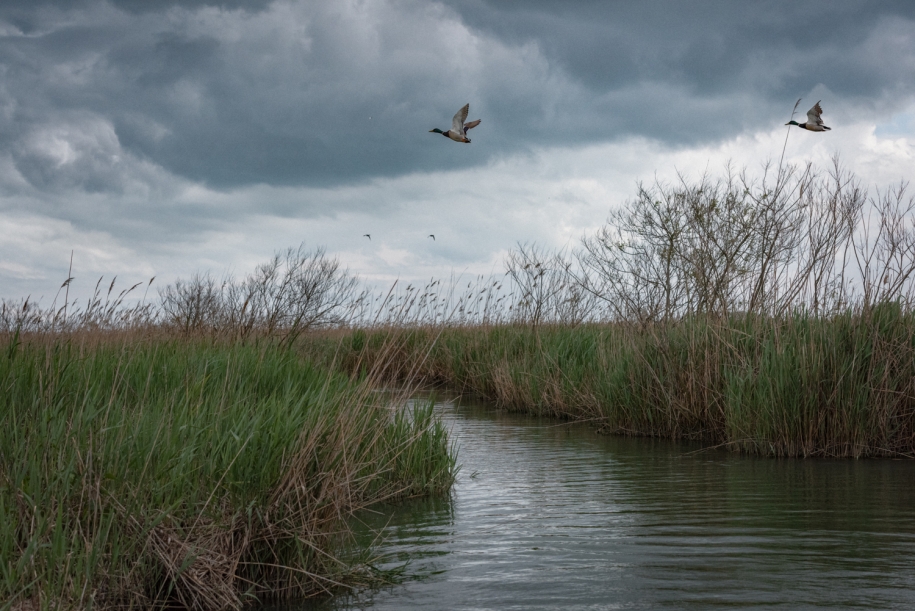

Porto Tolle, RO, 24 April 2023. Navigation through the wild reeds from the mouth of the Po di Tolle to the Allagamenti Sud lagoon. These intricate canals can only be traversed by small boats, depending on the tide level. They provide an ideal habitat for wetland flora and birdlife, and are home to egrets, mallards, ducks, pink flamingos, black-winged stilts, herons, cormorants and seagulls. The Po Delta, the largest wetland in Italy and one of the largest in Europe, is part of the Medwet (Wetlands for a sustainable Mediterranean region) and the EU observatory.
The leap of fish that dream of flying
Isabella Franceschini | Po Delta, Italy
Photographer: Isabella Franceschini
Exhibit Title: The leap of fish that dream of flying
Location: Po Delta, Italy
Po Delta, UNESCO MaB (Man and Biosphere) Reserve since 2015, is currently undergoing a significant transformation with the decommissioning of the colossal Italian thermal power plant in Polesine Camerini into an innovative and eco-sustainable tourist hotspot geared towards environmental conservation and local employment. This redevelopment project spans 300 hectares and it is part of the Futur-e project, led by the Enel Group, which aims to repurpose 23 disused industrial sites and a former mining area that that have completed their role in the energy system. Between 2021 and 2023, the work documented the economic and social fabric of this fragile area, historically threatened by hydraulic dangers such as floods and subsidence. Here, the complex relationship between river, land, and sea has influenced human settlements, engaged in uncertain adaptation to the morphology of an ecosystem in continuous evolution, further exacerbated by sudden climate changes. We are currently experiencing a historical period of profound transformation that urges us to reconsider our way of life, placing increasing emphasis on renewable energies and prioritizing pathways towards a zero-emission energy system.
The Po Delta is known for its unique combination of natural, industrial, and agricultural landscapes, shaped by centuries of human activity. Here, the complex relationship between river, land and sea, has influenced human settlements, engaged in an uncertain adaptation to the morphology of an ecosystem in continuous evolution, further exacerbated by sudden climate changes.
Designated as a UNESCO MaB (Man and Biosphere) Reserve since 2015, the Po Delta is currently undergoing a huge transformation. The industrial site of the Polesine Camerini thermoelectric power plant, one of Europe's earliest and Italy's largest, is being converted into an innovative and environmentally sustainable eco-tourist hotspot. Spanning 300 hectares, this redevelopment initiative allocates one portion to woodland and another to accommodation facilities and it is part of the Futur-e project, promoted by the Enel Group to repurpose 23 inactive industrial sites and a former mine that have completed their role in the energy system. The study and analysis of the local context involved the population, category associations, as well as local institutions. A committee comprising the Municipality, Region, University of Padua, Milan Polytechnic, and Enel evaluated the suitability of proposals based on technical and economic quality, innovation level, and environmental, economic, and social sustainability. The primary focus was on preserving employment levels and maximizing reuse. The future of the site might encompass sectors such as tourism, agri-food, and fishing, with ideas aimed at enhancing the value of the local area where the plant is situated and supporting equitable growth among specific population segments.
My work documents the economic and social structure of the vulnerable Po Delta during this period of significant change. This wetland, historically threatened by hydraulic dangers like floods and subsidence, stands as one of the most economically depressed areas in the Veneto Region and among the lowest in northern Italy in term of average standard of living of the population.
We are currently experiencing a historical period of sustainable transformations that urges us to reconsider our lifestyle, placing increasing emphasis on renewable energies and prioritizing pathways towards a zero-emission energy system.
I hope that the redevelopment of the Po Delta becomes an innovative example of circular economy and environmental protection which can be replicated and adapted in other regional and international contexts.
https://www.isabellafranceschini.com
info@isabella franceschini.com
Make Comment/View Comments